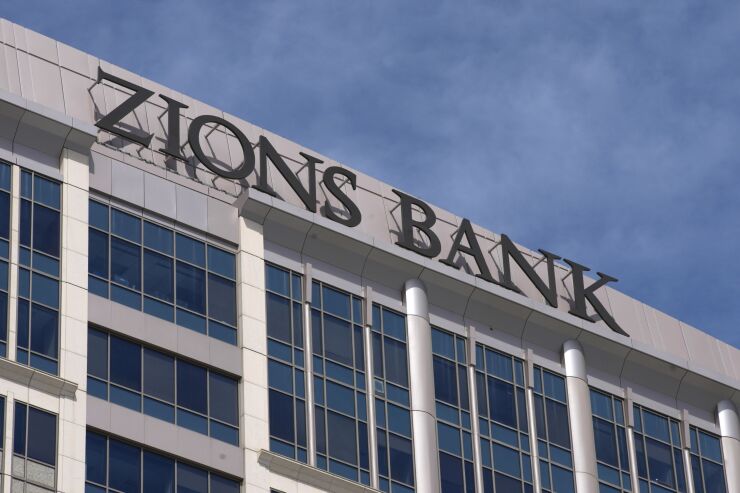
George Frey/Bloomberg
Zions Bancorp. says it’s keeping a tight rein on its hefty commercial real estate loan portfolio as the CRE
Commercial real estate represents nearly a quarter of the Salt Lake City bank’s total loan portfolio, and — although CRE loans drove a small uptick in originations — that asset class also contributed to Zions’ increase in problem loans. Still, Zions doesn’t expect major CRE-related losses, CEO Harris Simmons said on the bank’s fourth-quarter earnings call.
“Credit quality measures for the total CRE portfolio remained relatively strong, though criticized and classified levels increased in the quarter,” Chief Financial Officer Paul Burdiss added on the call, which was held Monday. “Overall, we continue to expect the CRE portfolio to perform well with limited losses based on the current economic outlook.”
The $87 billion-asset bank said it has taken a harder look at the underwriting of its commercial real estate portfolio, which led to a 2% increase in loans from Sept. 30 to Dec. 31. Net charge-offs are rising across banks, like
Still, Simmons said that Zions is comfortable with its credit performance and was “particularly pleased” with the credit quality of its overall loan portfolio.
Compass Point Research and Trading analysts wrote that they were surprised by Zions’ confidence in minimal credit losses despite the rise in classified loans. A Wedbush analyst note, which rated Zions as neutral, wrote that the bank’s credit quality was “mixed” and that a recession could hurt the company’s fundamentals.
At Zions, more than 20% of its office loans are showing signs of strain. Two previously reported suburban office loans totaling $46 million account for more than half of the increase in nonperforming assets at Zions. The bank’s office portfolio, which makes up 15% of its total commercial real estate loans, or 3% of its total loans, is facing “continued challenges” that the bank is working through, Chief Credit Officer Derek Steward said on the call.
Office loans
“2023 is likely to go into the record books as the slowest year for commercial real estate borrowing and lending in roughly a decade,” Jamie Woodwell, the association’s commercial real estate research lead, said in a prepared statement. “As the markets reset — on interest rates, property values, some property fundamentals and other factors — those volumes should pick up marginally.”
Steward said future losses are difficult to predict but that he doesn’t expect major losses from Zions’ $3.7 billion multifamily portfolio, which makes up more than one-fourth of its commercial real estate book. Although the percentage of risky multifamily loans at the bank more than doubled in the fourth quarter, Steward said the stress in the business came from delayed construction, higher interest rates and longer-than-expected timelines for filling leases.
“The fact that we’re seeing increased levels of criticized [loans] isn’t a great concern,” Simmons said. “In recent years, the equity going into [multifamily] deals is probably double what it was a decade ago, and so there is a lot more cushion and ability for these deals to experience some slowdown.”
Zions expects loan balances to remain “stable” in 2024 due to higher interest rates and uncertain economic outlook resulting in weak demand.
In the fourth quarter, the company
The company’s stock fell 1.25% to $42.77 on Tuesday.
Credit: Source link
